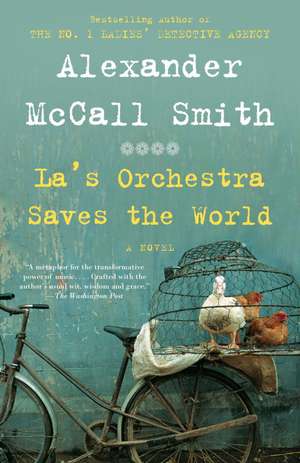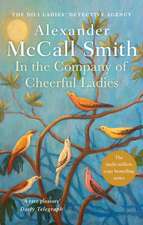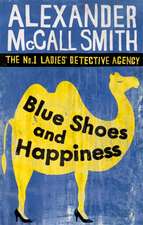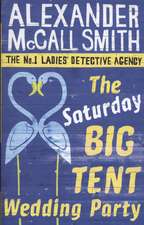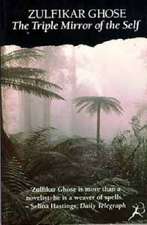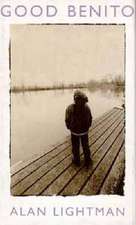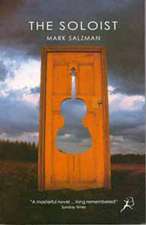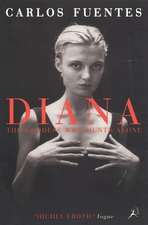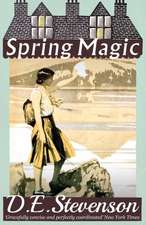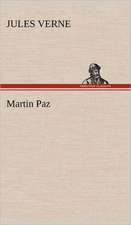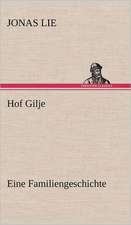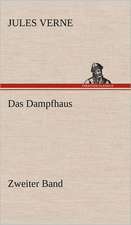La's Orchestra Saves the World
Autor Alexander McCall Smithen Limba Engleză Paperback – 30 noi 2010
When Lavender, La to her friends, moves to the Suffolk countryside, it’s not just to escape the London Blitz but also to flee the wreckage of a disastrous marriage. But as she starts to become a part of the community, she detects a sense of isolation. Her deep love of music and her desire to bring people together inspire her to start an orchestra. Little did she know that through this orchestra she would not only give hope and courage to the people of the community, but also that she would meet a man, Feliks, a shy upright Pole, who would change her life forever.
Preț: 86.17 lei
Nou
Puncte Express: 129
Preț estimativ în valută:
16.50€ • 17.00$ • 13.85£
16.50€ • 17.00$ • 13.85£
Carte indisponibilă temporar
Doresc să fiu notificat când acest titlu va fi disponibil:
Se trimite...
Preluare comenzi: 021 569.72.76
Specificații
ISBN-13: 9780307473042
ISBN-10: 030747304X
Pagini: 294
Dimensiuni: 135 x 201 x 19 mm
Greutate: 0.24 kg
Editura: Anchor Books
ISBN-10: 030747304X
Pagini: 294
Dimensiuni: 135 x 201 x 19 mm
Greutate: 0.24 kg
Editura: Anchor Books
Notă biografică
Alexander McCall Smith is the author of The No. 1 Ladies' Detective Agency series, the Isabel Dalhousie series, the Portuguese Irregular Vers series, and the 44 Scotland Street Series. He is professor emeritus of medical law at the University of Edinburgh and has served on many national and international bodies concerned with bioethics. He lives in Scotland.
Extras
One
Two men, who were brothers, went to Suffolk. One drove the car, an old Bristol drophead coupé in British racing green, while the other navigated, using an out-of-date linen-backed map. That the map was an old one did not matter too much: the roads they were following had been there for a long time and were clearly marked on their map—narrow lanes flanked by hedgerows following no logic other than ancient farm boundaries. The road signs—promising short distances of four miles, two miles, even half a mile—were made of heavy cast-iron, forged to last for generations of travellers. Some conscientious hand had kept them freshly painted, their black lettering sharp and clear against chalk-white backgrounds, pointing to villages with names that meant something a long time ago but which were now detached from the things to which they referred—the names of long-forgotten yeoman families, of mounds, of the crops they grew, of the wild flora of those parts. Garlic, cress, nettles, crosswort—all these featured in the place-names of the farms and villages that dotted the countryside—their comfortable names reminders of a gentle country that once existed in these parts, England. It still survived, of course, tenacious here and there, revealed in a glimpse of a languorous cricket match on a green, of a trout pool under willow branches, of a man in a flat cap digging up potatoes; a country that still existed but was being driven into redoubts such as this. The heart might ache for that England, thought one of the brothers; might ache for what we have lost.
They almost missed the turning to the village, so quickly did it come upon them. There were oak trees at the edge of a field and immediately beyond these, meandering off to the left, was the road leading to the place they wanted. The man with the map shouted out, “Whoa! Slow down,” and the driver reacted quickly, stamping on the brakes of the Bristol, bringing it to a halt with a faint smell of scorched rubber. They looked at the sign, which was a low one, almost obscured by the topmost leaves of nettles and clumps of cow parsley. It was the place.
It was a narrow road, barely wide enough for two vehicles. Here and there informal passing places had been established by local use—places where wheels had flattened the grass and pushed the hedgerows back a few inches. But you only needed these if there were other road-users, and there were none that Saturday afternoon. People were sleeping, or tending their gardens in the drowsy heat of summer, or perhaps just thinking.
“It’s very quiet, isn’t it?” remarked the driver when they stopped to check their bearings at the road end.
“That’s what I like about it,” said the other man. “This quietness. Do you remember that?”
“We would never have noticed it. We would have been too young.”
They drove on slowly to the edge of the village. The tower of a Norman church rose above a stand of alders. In some in?explicable mood of Victorian architectural enthusiasm, a small stone bobble, rather like a large cannonball, had been added at each corner of the tower. These additions were too small to ruin the original proportions, too large to be ignored; Suffolk churches were used to such spoliation, although in the past it had been carried out in a harsh mood of Puritan iconoclasm rather than prettification. There was to be no idolatry here: Marian and other suspect imagery had been rooted out, gouged from the wood of pew-ends and reredoses, chipped from stone baptismal fonts; stained glass survived, as it did here, only because it would be too costly to replace with the clear glass of Puritanism.
Behind the church, the main street, a winding affair, was lined mostly by houses, joined to one another in the cheek-by-jowl democracy of a variegated terrace. Some of these were built of stone, flinted here and there in patterns— triangles, wavy lines; others, of wattle and daub, painted either in cream or in that soft pink which gives to parts of Suffolk its gentle glow. There were a couple of shops and an old pub where a blackboard proclaimed the weekend’s fare: hotpot, fish stew, toad-in-the-hole; the stubborn cuisine of England.
“That post office,” said the driver. “What’s happened to it?”
The navigator had folded the map and tucked it away in the leather pocket in the side of the passenger door. He looked at his brother, and he nodded.
“Just beyond the end of the village,” said the driver. “It’s on the right. Just before . . .”
His brother looked at him. “Just before Ingoldsby’s Farm. Remember?”
The other man thought. A name came back to him, dredged up from a part of his memory he did not know he had. “The Aggs,” he said. “Mrs. Agg.”
She had been waiting for them, they thought, because she opened the door immediately after they rang the bell. She smiled, and gestured for them to come in, with the warmth, the eagerness of one who gets few callers.
“I just remember this house,” the driver said, looking about him. “Not very well, but just. Because when we were boys,” and he looked at his brother, “when we were boys we lived here. Until I was twelve. But you forget.”
His brother nodded in agreement. “Yes. You know how things look different when you’re young. They look much bigger.”
She laughed. “Because at that age one is looking at things from down there. Looking up. I was taken to see the Houses of Parliament when I was a little girl. I remember thinking that the tower of Big Ben was quite the biggest thing I had ever seen in my life—and it might have been, I suppose. But when I went back much later on, it seemed so much smaller. Rather disappointing, in fact.”
She ushered them through the hall into a sanctum beyond, a drawing room into which French windows let copious amounts of light. Beyond these windows, an expanse of grass stretched out to a high yew hedge, a dark-green backdrop for the herb?aceous beds lining the lawn. There was a hedge of lavender, too, grown woody through age.
“That was hers,” said the woman, pointing to the lavender hedge. “It needs cutting back, but I love it so much I can’t bring myself to do it.”
“La planted that?”
“I believe so,” said the woman.
“We played there,” said one of the brothers, looking out into the garden. “It’s odd to think that. But we played there. For hours and hours. Day after day.”
She left them and went to prepare tea. The brothers stood in front of the window.
“What I said about things looking bigger,” one said. “One might say the same about a person’s life, don’t you think? A life may look bigger when you’re a child, and then later on . . .”
“Narrower? Less impressive?”
“I think so.”
But the other thought that the opposite might be true, at least on occasion. “A friend told me about a teacher at school,” he said. “He was a very shy man. Timid. Ineffectual. And children mocked him—you know how quick they are to scent blood in the water. Then, later on, when he met him as an adult, he found out that this same teacher had been a well-known mountaineer and a difficult route had been named after him.”
“And La’s life?”
“I suspect that it was a very big one. A very big life led here . . .”
“In this out-of-the-way place.”
“Yes, in this sleepy little village.” He paused. “I suspect that our La was a real heroine.”
Their hostess had come back into the room, carrying a tray. She put it down on a table and gestured to the circle of chintzy sofa and chairs. She had heard the last remark, and agreed. “Yes. La was a heroine. Definitely a heroine.”
She poured the tea. “I assume that you know all about La. After all . . .” She hesitated. “But then she became ill, didn’t she, not so long after you all left this place. You can’t have been all that old when La died.”
From the Hardcover edition.
Two men, who were brothers, went to Suffolk. One drove the car, an old Bristol drophead coupé in British racing green, while the other navigated, using an out-of-date linen-backed map. That the map was an old one did not matter too much: the roads they were following had been there for a long time and were clearly marked on their map—narrow lanes flanked by hedgerows following no logic other than ancient farm boundaries. The road signs—promising short distances of four miles, two miles, even half a mile—were made of heavy cast-iron, forged to last for generations of travellers. Some conscientious hand had kept them freshly painted, their black lettering sharp and clear against chalk-white backgrounds, pointing to villages with names that meant something a long time ago but which were now detached from the things to which they referred—the names of long-forgotten yeoman families, of mounds, of the crops they grew, of the wild flora of those parts. Garlic, cress, nettles, crosswort—all these featured in the place-names of the farms and villages that dotted the countryside—their comfortable names reminders of a gentle country that once existed in these parts, England. It still survived, of course, tenacious here and there, revealed in a glimpse of a languorous cricket match on a green, of a trout pool under willow branches, of a man in a flat cap digging up potatoes; a country that still existed but was being driven into redoubts such as this. The heart might ache for that England, thought one of the brothers; might ache for what we have lost.
They almost missed the turning to the village, so quickly did it come upon them. There were oak trees at the edge of a field and immediately beyond these, meandering off to the left, was the road leading to the place they wanted. The man with the map shouted out, “Whoa! Slow down,” and the driver reacted quickly, stamping on the brakes of the Bristol, bringing it to a halt with a faint smell of scorched rubber. They looked at the sign, which was a low one, almost obscured by the topmost leaves of nettles and clumps of cow parsley. It was the place.
It was a narrow road, barely wide enough for two vehicles. Here and there informal passing places had been established by local use—places where wheels had flattened the grass and pushed the hedgerows back a few inches. But you only needed these if there were other road-users, and there were none that Saturday afternoon. People were sleeping, or tending their gardens in the drowsy heat of summer, or perhaps just thinking.
“It’s very quiet, isn’t it?” remarked the driver when they stopped to check their bearings at the road end.
“That’s what I like about it,” said the other man. “This quietness. Do you remember that?”
“We would never have noticed it. We would have been too young.”
They drove on slowly to the edge of the village. The tower of a Norman church rose above a stand of alders. In some in?explicable mood of Victorian architectural enthusiasm, a small stone bobble, rather like a large cannonball, had been added at each corner of the tower. These additions were too small to ruin the original proportions, too large to be ignored; Suffolk churches were used to such spoliation, although in the past it had been carried out in a harsh mood of Puritan iconoclasm rather than prettification. There was to be no idolatry here: Marian and other suspect imagery had been rooted out, gouged from the wood of pew-ends and reredoses, chipped from stone baptismal fonts; stained glass survived, as it did here, only because it would be too costly to replace with the clear glass of Puritanism.
Behind the church, the main street, a winding affair, was lined mostly by houses, joined to one another in the cheek-by-jowl democracy of a variegated terrace. Some of these were built of stone, flinted here and there in patterns— triangles, wavy lines; others, of wattle and daub, painted either in cream or in that soft pink which gives to parts of Suffolk its gentle glow. There were a couple of shops and an old pub where a blackboard proclaimed the weekend’s fare: hotpot, fish stew, toad-in-the-hole; the stubborn cuisine of England.
“That post office,” said the driver. “What’s happened to it?”
The navigator had folded the map and tucked it away in the leather pocket in the side of the passenger door. He looked at his brother, and he nodded.
“Just beyond the end of the village,” said the driver. “It’s on the right. Just before . . .”
His brother looked at him. “Just before Ingoldsby’s Farm. Remember?”
The other man thought. A name came back to him, dredged up from a part of his memory he did not know he had. “The Aggs,” he said. “Mrs. Agg.”
She had been waiting for them, they thought, because she opened the door immediately after they rang the bell. She smiled, and gestured for them to come in, with the warmth, the eagerness of one who gets few callers.
“I just remember this house,” the driver said, looking about him. “Not very well, but just. Because when we were boys,” and he looked at his brother, “when we were boys we lived here. Until I was twelve. But you forget.”
His brother nodded in agreement. “Yes. You know how things look different when you’re young. They look much bigger.”
She laughed. “Because at that age one is looking at things from down there. Looking up. I was taken to see the Houses of Parliament when I was a little girl. I remember thinking that the tower of Big Ben was quite the biggest thing I had ever seen in my life—and it might have been, I suppose. But when I went back much later on, it seemed so much smaller. Rather disappointing, in fact.”
She ushered them through the hall into a sanctum beyond, a drawing room into which French windows let copious amounts of light. Beyond these windows, an expanse of grass stretched out to a high yew hedge, a dark-green backdrop for the herb?aceous beds lining the lawn. There was a hedge of lavender, too, grown woody through age.
“That was hers,” said the woman, pointing to the lavender hedge. “It needs cutting back, but I love it so much I can’t bring myself to do it.”
“La planted that?”
“I believe so,” said the woman.
“We played there,” said one of the brothers, looking out into the garden. “It’s odd to think that. But we played there. For hours and hours. Day after day.”
She left them and went to prepare tea. The brothers stood in front of the window.
“What I said about things looking bigger,” one said. “One might say the same about a person’s life, don’t you think? A life may look bigger when you’re a child, and then later on . . .”
“Narrower? Less impressive?”
“I think so.”
But the other thought that the opposite might be true, at least on occasion. “A friend told me about a teacher at school,” he said. “He was a very shy man. Timid. Ineffectual. And children mocked him—you know how quick they are to scent blood in the water. Then, later on, when he met him as an adult, he found out that this same teacher had been a well-known mountaineer and a difficult route had been named after him.”
“And La’s life?”
“I suspect that it was a very big one. A very big life led here . . .”
“In this out-of-the-way place.”
“Yes, in this sleepy little village.” He paused. “I suspect that our La was a real heroine.”
Their hostess had come back into the room, carrying a tray. She put it down on a table and gestured to the circle of chintzy sofa and chairs. She had heard the last remark, and agreed. “Yes. La was a heroine. Definitely a heroine.”
She poured the tea. “I assume that you know all about La. After all . . .” She hesitated. “But then she became ill, didn’t she, not so long after you all left this place. You can’t have been all that old when La died.”
From the Hardcover edition.
Recenzii
"A metaphor for the transformative power of music.... crafted with the author's usual wit, wisdom and grace."
--Washington Post
"A big story about love, death, identity and music."
—The Lincoln Journal Star
"McCall Smith's characters are well-drawn and alive. . . . A satisfying work by a writer . . . who charms many readers."
--Providence Journal
“Beautifully precise and psychologically acute.”
—The Independent, London
"Delightful . . . McCall Smith once again creates unforgettable characters and a story that will resonate with readers across generations . . . A fresh and unforgettable story about the power of human kindness. Highly recommended."
—Booklist (starred review)
"The evocation of war-torn England, with its palpable mood of defiance, determination and survival, is beautifully caught . . . An excellent recreation of a woman of her time."
—The Scotsman
"Unlike anything else in McCall Smith's work."
—The Independent
"Alexander McCall Smith writes about the enduring, patient qualities of love . . . The novel pays heed to our national yearning for a story to chew on."
—The Times (London)
"A gentle and uplifting read."
—The Daily Mail
--Washington Post
"A big story about love, death, identity and music."
—The Lincoln Journal Star
"McCall Smith's characters are well-drawn and alive. . . . A satisfying work by a writer . . . who charms many readers."
--Providence Journal
“Beautifully precise and psychologically acute.”
—The Independent, London
"Delightful . . . McCall Smith once again creates unforgettable characters and a story that will resonate with readers across generations . . . A fresh and unforgettable story about the power of human kindness. Highly recommended."
—Booklist (starred review)
"The evocation of war-torn England, with its palpable mood of defiance, determination and survival, is beautifully caught . . . An excellent recreation of a woman of her time."
—The Scotsman
"Unlike anything else in McCall Smith's work."
—The Independent
"Alexander McCall Smith writes about the enduring, patient qualities of love . . . The novel pays heed to our national yearning for a story to chew on."
—The Times (London)
"A gentle and uplifting read."
—The Daily Mail
Descriere
From the bestselling author of The No. 1 Ladies' Detective Agency series comes a delightful and moving story that celebrates the healing powers of friendship and music.
